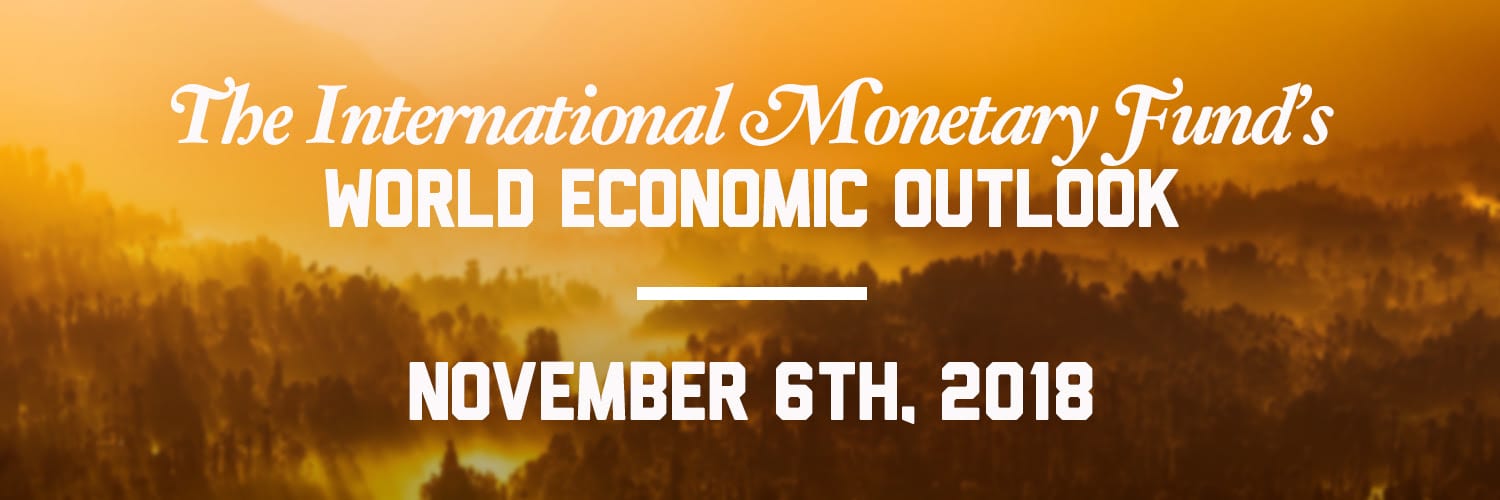Friday, October 29th, 2021
10:00 a.m. – 11:30 a.m. EDT
via Zoom
The Institute for International Economic Policy hosted a discussion of the International Monetary Fund’s October 2021 World Economic Outlook titled “IMF World Economic Outlook: Recovery During a Pandemic – Health Concerns, Supply Disruptions, and Price Pressures.” This event featured John Bluedorn (IMF), Christoffer Koch (IMF), Tara Sinclair (GWU), Jean-Marc Natal (IMF), and Benjamin Jones (Northwestern University). This event was moderated by IIEP Director Jay Shambaugh.
The global economic recovery is continuing, even as the pandemic resurges. The fault lines opened up by COVID-19 are looking more persistent—near-term divergences are expected to leave lasting imprints on medium-term performance. Vaccine access and early policy support are the principal drivers of the gaps.
The IMF World Economic Outlook — the flagship publication of the IMF — details the state of the global economy and its prospects going forward. It also includes two analytical chapters considering key policy issues facing the world economy. Chapter 2 considers the appropriate policy mix as many countries face elevated or rising inflation. Chapter 3 examines how countries could use science and innovation policy to boost long run economic growth. This event presents an opportunity for policymakers and academics to consider these crucial issues.
Event Agenda
Welcoming Remarks
Jay Shambaugh, George Washington University
Chapter 1: Global Prospects and Policies
Presenter: John Bluedorn, International Monetary Fund
Chapter 2: Inflation Scares
Presenter: Christoffer Koch, International Monetary Fund
Discussant: Tara Sinclair, George Washington University
Chapter 3: Research and Innovation: Fighting the Pandemic and Boosting Long-Term Growth
Presenter: Jean-Marc Natal, International Monetary Fund
Discussant: Benjamin Jones, Northwestern University
General Q&A and Concluding Remarks
Moderated by Jay Shambaugh, George Washington University
About the Speakers:
 John Bluedorn is a deputy division chief on the World Economic Outlook in the IMF’s Research Department. Previously, he has been a senior economist in the Research Department’s Structural Reforms Unit, a member of the IMF’s euro area team in the European Department and worked on the World Economic Outlook as an economist, contributing to a number of chapters. Before joining the IMF, he was a professor at the University of Southampton in the United Kingdom, after a post-doctoral fellowship at the University of Oxford. Mr. Bluedorn has published on a range of topics in international finance, macroeconomics, and development. He holds a PhD from the University of California at Berkeley.
John Bluedorn is a deputy division chief on the World Economic Outlook in the IMF’s Research Department. Previously, he has been a senior economist in the Research Department’s Structural Reforms Unit, a member of the IMF’s euro area team in the European Department and worked on the World Economic Outlook as an economist, contributing to a number of chapters. Before joining the IMF, he was a professor at the University of Southampton in the United Kingdom, after a post-doctoral fellowship at the University of Oxford. Mr. Bluedorn has published on a range of topics in international finance, macroeconomics, and development. He holds a PhD from the University of California at Berkeley.
Christoffer Koch works in the Research Department of the International Monetary Fund. Prior to that he had spent a decade as an economist at the Federal Reserve Bank of Dallas. His policy and research interests are in macroeconomics, money and banking. He obtained his undergraduate degree from the University of St Andrews, and his PhD from the University of Oxford where he was a Rhodes Scholar.
 Jean-Marc Natal is Deputy Division Chief in the World Economic Studies Division in the IMF’s Research Department. Prior to joining the IMF, he was Deputy Director of Research at the Swiss National Bank where he advised the Board on quarterly monetary policy decisions and communication. Mr Natal has taught Monetary Theory and Policy at the University of Geneva and has published in various economics journals, including the Economic Journal and the Journal of Money, Credit and Banking. His research covers the study of monetary and exchange rate regimes, policy transmission, inflation dynamics and macroeconomic modeling. He holds a PhD in International Economics from the Graduate Institute of International Studies in Geneva.
Jean-Marc Natal is Deputy Division Chief in the World Economic Studies Division in the IMF’s Research Department. Prior to joining the IMF, he was Deputy Director of Research at the Swiss National Bank where he advised the Board on quarterly monetary policy decisions and communication. Mr Natal has taught Monetary Theory and Policy at the University of Geneva and has published in various economics journals, including the Economic Journal and the Journal of Money, Credit and Banking. His research covers the study of monetary and exchange rate regimes, policy transmission, inflation dynamics and macroeconomic modeling. He holds a PhD in International Economics from the Graduate Institute of International Studies in Geneva.
About the Discussants:
 Tara M. Sinclair is a faculty affiliate of the Institute for International Economic Policy and professor of economics and international affairs at the George Washington University, where she has been on faculty since earning her PhD in economics from Washington University in St. Louis in 2005. Professor Sinclair is a senior fellow at job search site Indeed, the co-director of the H. O. Stekler Research Program on Forecasting, a member of the Bureau of Labor Statistics Technical Advisory Committee, a research professor at the Halle Institute for Economic Research (IWH) in Germany, and a research associate at the Center for Applied Macroeconomic Analysis (CAMA). She has been a visiting scholar at the Federal Reserve Bank of St. Louis, a visiting associate professor at the University of Texas at Austin, and an academic visitor at the Australian National University and the University of New South Wales. Professor Sinclair also serves as the moderator for the monthly inflation meet-ups for the National Association for Business Economics. Professor Sinclair’s research focuses on developing new tools and data sources to improve decision making. Her early research built empirical models to study economic fluctuations and trends, and these models remain a continuing thread in her publications. As part of the Indeed Hiring Lab, Professor Sinclair uses Indeed’s unique labor market data to develop new economic indicators. As co-director of the H. O. Stekler Research Program on Forecasting, she evaluates real time economic data and forecasts with a focus on their role in policy. Professor Sinclair regularly speaks at conferences and with the press on issues related to forecasting, recessions, labor markets, big data, macroeconomics, and policy issues.
Tara M. Sinclair is a faculty affiliate of the Institute for International Economic Policy and professor of economics and international affairs at the George Washington University, where she has been on faculty since earning her PhD in economics from Washington University in St. Louis in 2005. Professor Sinclair is a senior fellow at job search site Indeed, the co-director of the H. O. Stekler Research Program on Forecasting, a member of the Bureau of Labor Statistics Technical Advisory Committee, a research professor at the Halle Institute for Economic Research (IWH) in Germany, and a research associate at the Center for Applied Macroeconomic Analysis (CAMA). She has been a visiting scholar at the Federal Reserve Bank of St. Louis, a visiting associate professor at the University of Texas at Austin, and an academic visitor at the Australian National University and the University of New South Wales. Professor Sinclair also serves as the moderator for the monthly inflation meet-ups for the National Association for Business Economics. Professor Sinclair’s research focuses on developing new tools and data sources to improve decision making. Her early research built empirical models to study economic fluctuations and trends, and these models remain a continuing thread in her publications. As part of the Indeed Hiring Lab, Professor Sinclair uses Indeed’s unique labor market data to develop new economic indicators. As co-director of the H. O. Stekler Research Program on Forecasting, she evaluates real time economic data and forecasts with a focus on their role in policy. Professor Sinclair regularly speaks at conferences and with the press on issues related to forecasting, recessions, labor markets, big data, macroeconomics, and policy issues.
 Benjamin F. Jones is the Gordon and Llura Gund Family Professor of Entrepreneurship, a Professor of Strategy, and the faculty director of the Kellogg Innovation and Entrepreneurship Initiative. An economist by training, Professor Jones studies the sources of economic growth in advanced economies, with an emphasis on innovation, entrepreneurship, and scientific progress. He also studies global economic development, including the roles of education, climate, and national leadership in explaining the wealth and poverty of nations. His research has appeared in journals such as Science, the Quarterly Journal of Economics and the American Economic Review, and has been profiled in media outlets such as the Wall Street Journal, the Economist, and The New Yorker. A former Rhodes Scholar, Professor Jones served in 2010-2011 as the senior economist for macroeconomics for the White House Council of Economic Advisers and earlier served in the U.S. Department of the Treasury. Professor Jones is a non-resident senior fellow of the Brookings Institution, a research associate of the National Bureau of Economic Research, and a member of the Council on Foreign Relations.
Benjamin F. Jones is the Gordon and Llura Gund Family Professor of Entrepreneurship, a Professor of Strategy, and the faculty director of the Kellogg Innovation and Entrepreneurship Initiative. An economist by training, Professor Jones studies the sources of economic growth in advanced economies, with an emphasis on innovation, entrepreneurship, and scientific progress. He also studies global economic development, including the roles of education, climate, and national leadership in explaining the wealth and poverty of nations. His research has appeared in journals such as Science, the Quarterly Journal of Economics and the American Economic Review, and has been profiled in media outlets such as the Wall Street Journal, the Economist, and The New Yorker. A former Rhodes Scholar, Professor Jones served in 2010-2011 as the senior economist for macroeconomics for the White House Council of Economic Advisers and earlier served in the U.S. Department of the Treasury. Professor Jones is a non-resident senior fellow of the Brookings Institution, a research associate of the National Bureau of Economic Research, and a member of the Council on Foreign Relations.
About the Moderator:
 Jay Shambaugh is Professor of Economics and International Affairs, and Director of the Institute for International Economic Policy at the Elliott School of International Affairs, George Washington University. His area of research is macroeconomics and international economics. He has had two stints in public service. He served as a Member of the White House Council of Economic Advisors from 2015-2017. Earlier, he served on the staff of the CEA as a Senior Economist for International Economics and then as the Chief Economist. He also spent 3 years as the Director of the Hamilton Project at the Brookings Institution. Jay is also a Faculty Research Fellow at the NBER and Non-Resident Senior Fellow in Economic Studies at Brookings. Prior to joining the faculty at George Washington, Jay taught at Georgetown and Dartmouth and was a visiting scholar at the IMF. He received his Ph.D. in economics from the University of California at Berkeley, an M.A. from the Fletcher School at Tufts, and a B.A. from Yale University.
Jay Shambaugh is Professor of Economics and International Affairs, and Director of the Institute for International Economic Policy at the Elliott School of International Affairs, George Washington University. His area of research is macroeconomics and international economics. He has had two stints in public service. He served as a Member of the White House Council of Economic Advisors from 2015-2017. Earlier, he served on the staff of the CEA as a Senior Economist for International Economics and then as the Chief Economist. He also spent 3 years as the Director of the Hamilton Project at the Brookings Institution. Jay is also a Faculty Research Fellow at the NBER and Non-Resident Senior Fellow in Economic Studies at Brookings. Prior to joining the faculty at George Washington, Jay taught at Georgetown and Dartmouth and was a visiting scholar at the IMF. He received his Ph.D. in economics from the University of California at Berkeley, an M.A. from the Fletcher School at Tufts, and a B.A. from Yale University.
IMF WEO Chapter Summaries
Chapter 1: Global Prospects and Policies




 Dr. Danny Leipziger is Professor of International Business and International Affairs at George Washington University, where he is concurrently the Managing Director of the Growth Dialogue. Professor Leipziger has been a faculty member in the highly-ranked International Business Department since 2009, where he has taught both undergraduate and graduate courses on macroeconomics, applied development, financial crises, and international economics, and he has taught in the GW/IFC/Milken Capital Markets Graduate Program for mid-career government officials since its inception. He has been advisor to the governments of South Korea, Vietnam, Ivory Coast, Uzbekistan, Argentina, and South Africa, among others.
Dr. Danny Leipziger is Professor of International Business and International Affairs at George Washington University, where he is concurrently the Managing Director of the Growth Dialogue. Professor Leipziger has been a faculty member in the highly-ranked International Business Department since 2009, where he has taught both undergraduate and graduate courses on macroeconomics, applied development, financial crises, and international economics, and he has taught in the GW/IFC/Milken Capital Markets Graduate Program for mid-career government officials since its inception. He has been advisor to the governments of South Korea, Vietnam, Ivory Coast, Uzbekistan, Argentina, and South Africa, among others.

 James E. Foster is the Oliver T. Carr Professor of International Affairs and Professor of Economics at the George Washington University. He received his Ph.D. in economics from Cornell University and holds a Doctorate Honoris Causa from Universidad Autónoma del Estado de Hidalgo (Mexico). Professor Foster’s research focuses on welfare economics — using economic tools to evaluate and enhance the wellbeing of people. His joint 1984 Econometrica paper (with Joel Greer and Erik Thorbecke) is one of the most cited papers on poverty. It introduced the FGT Index, which has been used in thousands of studies and was employed in targeting the Progresa CCT program in México. Other research includes work on economic inequality with Amartya Sen; on the distribution of human development with Luis Felipe Lopez-Calva and Miguel Szekely; on multidimensional poverty with Sabina Alkire; and on literacy with Kaushik Basu. Foster regularly teaches introductory and doctoral courses on international development and each spring joins with Professor Basu in presenting an undergraduate course on Game Theory and Strategic Thinking, to which staff and Board members of the World Bank are also invited. Professor Foster is also Research Fellow at the Oxford Poverty and Human Development Initiative (OPHI), Department of International Development, Oxford University, and a member of the Human Capital and Economic Opportunity (HCEO) Working Group, Becker Friedman Institute for Research in Economics, University of Chicago. He also previously served as an Advisory Board Member on the World Bank’s Commission on Global Poverty.
James E. Foster is the Oliver T. Carr Professor of International Affairs and Professor of Economics at the George Washington University. He received his Ph.D. in economics from Cornell University and holds a Doctorate Honoris Causa from Universidad Autónoma del Estado de Hidalgo (Mexico). Professor Foster’s research focuses on welfare economics — using economic tools to evaluate and enhance the wellbeing of people. His joint 1984 Econometrica paper (with Joel Greer and Erik Thorbecke) is one of the most cited papers on poverty. It introduced the FGT Index, which has been used in thousands of studies and was employed in targeting the Progresa CCT program in México. Other research includes work on economic inequality with Amartya Sen; on the distribution of human development with Luis Felipe Lopez-Calva and Miguel Szekely; on multidimensional poverty with Sabina Alkire; and on literacy with Kaushik Basu. Foster regularly teaches introductory and doctoral courses on international development and each spring joins with Professor Basu in presenting an undergraduate course on Game Theory and Strategic Thinking, to which staff and Board members of the World Bank are also invited. Professor Foster is also Research Fellow at the Oxford Poverty and Human Development Initiative (OPHI), Department of International Development, Oxford University, and a member of the Human Capital and Economic Opportunity (HCEO) Working Group, Becker Friedman Institute for Research in Economics, University of Chicago. He also previously served as an Advisory Board Member on the World Bank’s Commission on Global Poverty. Jennifer G. Cooke is director of the Institute for African Studies at The George Washington University Elliott School of International Affairs. The Institute serves as central for research, scholarly discussion, and debate on issues relevant to Africa. She is a professor of practice in international affairs, teaching courses on U.S. Policy Toward Africa and Transnational Security Threats in Africa. Cooke joined George Washington University in August 2018, after 18 years as director of the Africa Program at the Center for Strategic and International Studies (CSIS), where she led research and analysis on political, economic, and security dynamics in Africa. While at CSIS, Cooke directed projects on a wide range of African issues, including on violent extremist organizations in the Sahel and Lake Chad Basin, China’s growing role in Africa, democracy and elections in Nigeria, religion and state authority in Africa, “stress-testing” state stability in Africa, Africa’s changing energy landscape, and more. She is a frequent writer and lecturer on U.S.-Africa policy and has provided briefing, commentary, and testimony to the media, US Congress, AFRICOM leadership and the U.S. military. She has traveled widely in Africa and has been an election observer in Sierra Leone, Ghana, Liberia, Mali, and Nigeria. As a teenager, she lived in Cote d’Ivoire and the Central African Republic. She holds an M.A. in African studies and international economics from the Johns Hopkins University School of Advanced International Studies (SAIS) and a B.A. in government, magna cum laude, from Harvard University.
Jennifer G. Cooke is director of the Institute for African Studies at The George Washington University Elliott School of International Affairs. The Institute serves as central for research, scholarly discussion, and debate on issues relevant to Africa. She is a professor of practice in international affairs, teaching courses on U.S. Policy Toward Africa and Transnational Security Threats in Africa. Cooke joined George Washington University in August 2018, after 18 years as director of the Africa Program at the Center for Strategic and International Studies (CSIS), where she led research and analysis on political, economic, and security dynamics in Africa. While at CSIS, Cooke directed projects on a wide range of African issues, including on violent extremist organizations in the Sahel and Lake Chad Basin, China’s growing role in Africa, democracy and elections in Nigeria, religion and state authority in Africa, “stress-testing” state stability in Africa, Africa’s changing energy landscape, and more. She is a frequent writer and lecturer on U.S.-Africa policy and has provided briefing, commentary, and testimony to the media, US Congress, AFRICOM leadership and the U.S. military. She has traveled widely in Africa and has been an election observer in Sierra Leone, Ghana, Liberia, Mali, and Nigeria. As a teenager, she lived in Cote d’Ivoire and the Central African Republic. She holds an M.A. in African studies and international economics from the Johns Hopkins University School of Advanced International Studies (SAIS) and a B.A. in government, magna cum laude, from Harvard University. Andrew Tiffin is a senior economist at the IMF, working in the regional studies division of the Fund’s African Department. He is also keenly involved in the effort to incorporate artificial intelligence/machine-learning techniques into the standard analytical toolkit of the Fund. Previously, he has worked on Middle Eastern countries, with a particular interest in refugee issues in Jordan and Lebanon, as well as numerous countries in Europe–he was part of the Italy team during the debt crisis of 2012, and part of the Russia team for the global financial crisis of 2008. Raised in Sydney, Andrew is an Australian national. He received his post-graduate training at Princeton University, where he obtained both a Ph.D. in economics and an M.P.A. in international relations. In addition to his work with the Fund, Andrew has held positions at the Reserve Bank of Australia, and with the Australian Government.
Andrew Tiffin is a senior economist at the IMF, working in the regional studies division of the Fund’s African Department. He is also keenly involved in the effort to incorporate artificial intelligence/machine-learning techniques into the standard analytical toolkit of the Fund. Previously, he has worked on Middle Eastern countries, with a particular interest in refugee issues in Jordan and Lebanon, as well as numerous countries in Europe–he was part of the Italy team during the debt crisis of 2012, and part of the Russia team for the global financial crisis of 2008. Raised in Sydney, Andrew is an Australian national. He received his post-graduate training at Princeton University, where he obtained both a Ph.D. in economics and an M.P.A. in international relations. In addition to his work with the Fund, Andrew has held positions at the Reserve Bank of Australia, and with the Australian Government. Louise Fox is an experienced development economist who specializes in strategies for employment creation, opportunity expansion, economic empowerment, and poverty reduction. She has advised governments in the developed and developing world, international organizations, and philanthropic and non-profit organizations on problem diagnosis, strategies for results, and outcome measurement. She held full-time positions at USAID (as Chief Economist) and at the World Bank. She is currently affiliated with the African Growth Initiative at the Brookings Institution and the Blum Center for Developing Economies, University of California, Berkeley. She was previously affiliated with the Overseas Development Institute, where she led a major research project. Louise has published in the areas of inclusive growth, structural transformation, youth employment, the political economy of poverty reduction, gender and women’s economic empowerment, employment, labor markets, and labor regulation, pension reform, reform of child welfare systems, social protection, effective public expenditures in the social sectors, and female-headed households and child welfare. Her most recent book was Youth Employment in Sub-Saharan Africa, published by the World Bank in 2014.
Louise Fox is an experienced development economist who specializes in strategies for employment creation, opportunity expansion, economic empowerment, and poverty reduction. She has advised governments in the developed and developing world, international organizations, and philanthropic and non-profit organizations on problem diagnosis, strategies for results, and outcome measurement. She held full-time positions at USAID (as Chief Economist) and at the World Bank. She is currently affiliated with the African Growth Initiative at the Brookings Institution and the Blum Center for Developing Economies, University of California, Berkeley. She was previously affiliated with the Overseas Development Institute, where she led a major research project. Louise has published in the areas of inclusive growth, structural transformation, youth employment, the political economy of poverty reduction, gender and women’s economic empowerment, employment, labor markets, and labor regulation, pension reform, reform of child welfare systems, social protection, effective public expenditures in the social sectors, and female-headed households and child welfare. Her most recent book was Youth Employment in Sub-Saharan Africa, published by the World Bank in 2014. Seung Mo Choi is a Senior Economist working on regional surveillance in the IMF’s African Department. He has worked on banking crises, financial market policies, climate change, low-income country issues, and capacity development, including in the IMF’s European Department and in the Institute for Capacity Development. His research has been published in economics and finance journals such as International Economic Review. Prior to joining the IMF, he worked as an Assistant Professor at Washington State University and obtained a Ph.D. in economics from the University of Chicago and a B.A. in economics from Seoul National University.
Seung Mo Choi is a Senior Economist working on regional surveillance in the IMF’s African Department. He has worked on banking crises, financial market policies, climate change, low-income country issues, and capacity development, including in the IMF’s European Department and in the Institute for Capacity Development. His research has been published in economics and finance journals such as International Economic Review. Prior to joining the IMF, he worked as an Assistant Professor at Washington State University and obtained a Ph.D. in economics from the University of Chicago and a B.A. in economics from Seoul National University. Stephen C. Smith is Professor of Economics and International Affairs at George Washington University. In 2018 he was UNICEF Senior Fellow at the UNICEF Office of Research-Innocenti, Florence, Italy. Smith received his Ph.D. in Economics from Cornell University and has been a Fulbright Research Scholar, a Jean Monnet Research Fellow, a Visiting Fellow at the Brookings Institution, a Nonresident Senior Fellow at Brookings, a Fulbright Senior Specialist, a member of the Advisory Council of BRAC USA, and an Associate Editor of the Journal of Economic Behavior and Organization. He has twice served as Director of the Institute for International Economic Policy at GWU. Smith is the co-author with Michael Todaro of Economic Development (12th Edition, Pearson, 2014). He is also author of Ending Global Poverty: A Guide to What Works (paperback edition Palgrave Macmillan, 2009), and co-editor with Jennifer Brinkerhoff and Hildy Teegen of NGOs and the Millennium Development Goals: Citizen Action to Reduce Poverty (Palgrave Macmillan, 2007). He is also author or coauthor of about 45 professional journal articles and many other publications. Smith’s recent research has focused on extreme poverty and strategies and programs to address it; and on the economics of adaptation and resilience to climate change in low-income countries, emphasizing autonomous adaptation by households and communities and its effects, and adaptation financing.
Stephen C. Smith is Professor of Economics and International Affairs at George Washington University. In 2018 he was UNICEF Senior Fellow at the UNICEF Office of Research-Innocenti, Florence, Italy. Smith received his Ph.D. in Economics from Cornell University and has been a Fulbright Research Scholar, a Jean Monnet Research Fellow, a Visiting Fellow at the Brookings Institution, a Nonresident Senior Fellow at Brookings, a Fulbright Senior Specialist, a member of the Advisory Council of BRAC USA, and an Associate Editor of the Journal of Economic Behavior and Organization. He has twice served as Director of the Institute for International Economic Policy at GWU. Smith is the co-author with Michael Todaro of Economic Development (12th Edition, Pearson, 2014). He is also author of Ending Global Poverty: A Guide to What Works (paperback edition Palgrave Macmillan, 2009), and co-editor with Jennifer Brinkerhoff and Hildy Teegen of NGOs and the Millennium Development Goals: Citizen Action to Reduce Poverty (Palgrave Macmillan, 2007). He is also author or coauthor of about 45 professional journal articles and many other publications. Smith’s recent research has focused on extreme poverty and strategies and programs to address it; and on the economics of adaptation and resilience to climate change in low-income countries, emphasizing autonomous adaptation by households and communities and its effects, and adaptation financing. Preya Sharma is a senior economist in the African Department of the IMF where she is Special Assistant to the Director. Her research has focused on structural transformation, the future of work, and digitalization in sub-Saharan Africa, as well as emerging market crises and development. Before joining the IMF she was the Head of Emerging Markets at HM Treasury in the UK. She holds a Masters in Public Administration in International Development from the Harvard Kennedy School and a BSc in Economics from the London School of Economics.
Preya Sharma is a senior economist in the African Department of the IMF where she is Special Assistant to the Director. Her research has focused on structural transformation, the future of work, and digitalization in sub-Saharan Africa, as well as emerging market crises and development. Before joining the IMF she was the Head of Emerging Markets at HM Treasury in the UK. She holds a Masters in Public Administration in International Development from the Harvard Kennedy School and a BSc in Economics from the London School of Economics.

